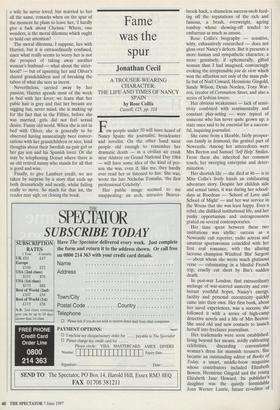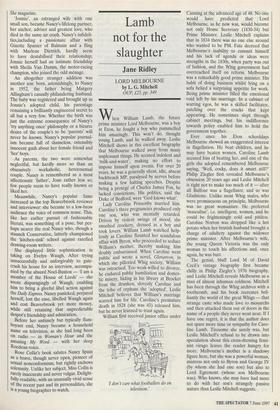Fame was the spur
Jonathan Cecil
A TROUSER-WEARING CHARACTER: THE LIFE AND TIMES OF NANCY SPAIN by Rose Collis Cassell, £25, pp. 318 Few people under 50 will have heard of Nancy Spain; the journalist, broadcaster and novelist. On the other hand most people old enough to remember her dramatic death — in a civilian air crash near Aintree on Grand National Day 1964 — will have some idea of the kind of per- son she was, even if, like me, they hardly ever read her or listened to her. She was, wrote the late Nicholas Tomalin, 'the first professional Celebrity'. Her public image seemed to me unappealing: an arch, intrusive Beaver- brook hack, a shameless success-snob feed- ing off the reputations of the rich and famous, a brash, overweight, ageing tomboy whose showing-off tended to embarrass as much as amuse.
Rose Collis's biography — sensitive, witty, exhaustively researched — does not gloss over Nancy's defects. But it presents a more human and sympathetic character, a more genuinely, if ephemerally, gifted woman than I had imagined, convincingly evoking the irrepressible joie de vivre which won the affection not only of the mass pub- lic but of Noel Coward, Hermione Gingold, Sandy Wilson, Denis Norden, Tony War- ren, creator of Coronation Street, and also a series of lesbian lovers.
Her obvious weaknesses — lack of sensi- tivity combined with sentimentality and constant play-acting — were typical of someone who has never quite grown up; a state once said to be essential for a success- ful, inquiring journalist.
She came from a likeable, fairly prosper- ous family in Jesmond, the genteel part of Newcastle. Among her antecedents were Mrs Beeton and Samuel 'Self Help' Smiles. From them she inherited her common touch, her sweeping enterprise and deter- mination.
Her shortish life — she died at 46 — is in Miss Collis's lively hands an exhilarating adventure story. Despite her childish side and sexual tastes, it was during her school- days at Roedean — 'School of Love and School of Might' — and her war service in the Wrens that she was least happy. Ever a rebel, she disliked institutional life, and her pushy opportunism and outrageousness grated on several contemporaries.
Her time spent between these two institutions was idyllic: success as a Newcastle cub reporter, radio actress and amateur sportswoman coincided with her first real romance, with the alluring lacrosse champion Winifred 'Bin' Sargent — about whom she wrote much glutinous verse — culminating in a blissful French trip, cruelly cut short by Bin's sudden death.
In post-war London, that extraordinary melange of war-scarred austerity and exu- berant youthful hopes, Nancy's energy, facility and personal eccentricity quickly came into their own. Her first book, about her naval experiences, was a success; she followed it with a series of high-camp detective novels and a life of Mrs Beeton. She used old and new contacts to launch herself into freelance journalism. Her trademarks were soon established: living beyond her means, avidly cultivating celebrities, discarding conventional woman's dress for mannish trousers. She became an outstanding editor of Books .of Today, a smart, middle-brow magazine whose contributors included Elizabeth Bowen, Hermione Gingold and the young Elizabeth Jane Howard. Its publisher's daughter was the quietly formidable Joan Werner Laurie, future co-editor of She magazine.
'Jamie', an estranged wife with one small son, became Nancy's lifelong partner, her anchor, adviser and greatest love, who died in the same air crash. Nancy's infideli- ties,including a passionate affair with Ginette Spanier of Balmain and a fling with Marlene Dietrich, hardly seem to have destabilised their relationship; Jonnie herself had an intimate friendship with Sheila Van Damm, the motor-racing champion, who joined the odd ménage.
An altogether stranger addition was another son: born, astonishingly, to Nancy in 1952, the father being Margery Allingham's casually philandering husband. The baby was registered and brought up as Jonnie's adopted child, his parentage remaining a brilliantly engineered secret to all but a very few. Whether the birth was just the extreme consequence of Nancy's 'try anything once' philosophy or a bizarre desire of the couple's to be 'parents' will never be known. Nancy's popular journal- ism became full of shameless, ostensibly innocent gush about her female friend and 'her' boys.
As parents, the two were somewhat neglectful, but hardly more so than an obsessively workaholic, heterosexual couple. Nancy is remembered as a most affectionate 'father', Joan rather less so; few people seem to have really known or liked her.
Meanwhile, Nancy's popular fame increased as the top Beaverbrook reviewer and interviewer: she became to a low-brow audience the voice of common sense. This, like her earlier pursuit of fashionable literati, was something of a pose, but per- haps nearer the real Nancy who, though a staunch Conservative, latterly championed the 'kitchen-sink' school against rarefied drawing-room writers.
She displayed little sophistication in taking on Evelyn Waugh. After trying unsuccessfully and unforgivably to gate- crash his house for an interview, accompa- nied by the absurd Noel-Buxton — 'I am a member of the House of Lords' — she wrote disparagingly of Waugh, enabling him to bring a gleeful libel action against the Daily Express. Nancy panicked, perjured herself, lost the case, libelled Waugh again and cost Beaverbrook yet more money, while still retaining that unpredictable despot's friendship and admiration. Before her untimely but typically flam- boyant end, Nancy became a household name on television, as she had long been on radio — in Woman's Hour and the amusing My Word — with her deep Roedean voice.
Rose Collis's book salutes Nancy Spain as a brave, though never open, pioneer of sexual nonconformism, but rightly eschews solemnity. Unlike her subject, Miss Collis is rarely inaccurate and never vulgar. Delight- fully readable, with an unusually vivid sense Of the recent past and its personalities, she is a young biographer to watch.











































































 Previous page
Previous page